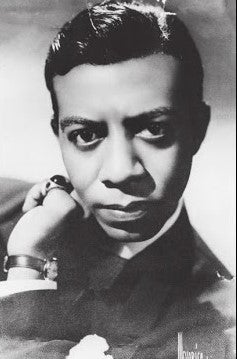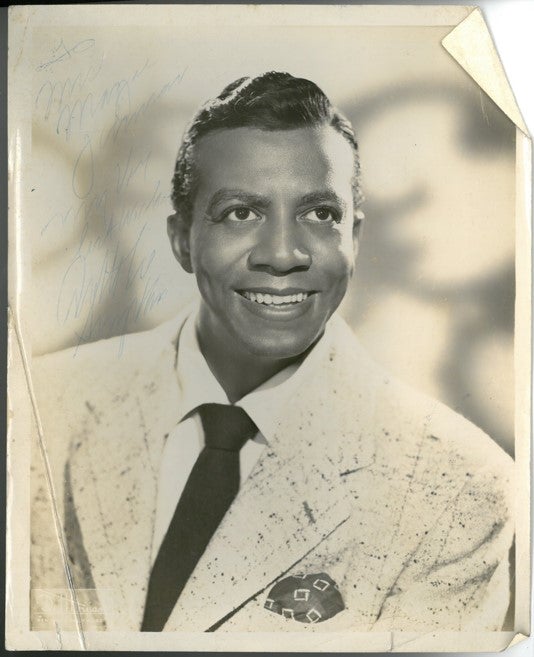(Editor’s note: This article was first published on Sep. 26, 2022.)
Jessye Norman remains a towering name on the international opera scene, and even after her death, she remains a big part of Augusta’s cultural fabric, and James Brown will always be known as the most famous musician to originate from Augusta.
However, the name of the man who blazed a trail for Norman and Brown has largely been lost to memory.

At a time when most Black musicians were solely into jazz, Arthur Lee Simpkins applied his unique singing skills to the popular music of the time, but also crossed over into opera and spirituals that originated from the Black Christian church.
Simpkins would go on to international fame, setting the template for both Norman and even Brown, and like them, he never forgot his hometown.
Simpkins was born in 1909 across the river in Hamburg, S.C., and his family later moved to Augusta. Like Norman and Brown, Simpkins’ singing career took off in the church. As a young man, Simpkins became a featured singer at the Thankful Baptist Church which was located at Third Street and Walker Street.
According to Augusta Magazine, Simpkins did receive formal voice training from his sister-in-law, Ruby Thomas Robinson, who was director of music at Paine College.
Simpkins’ wife Aurora was also a singer, but it appears she preferred to sing mainly in church.
MORE: Something you may not have known: Augusta’s ties to the British monarchy
However, singing alone did not pay the bills, and even though his star was rising regionally, Simpkins had a side gig as a porter for Georgia Railroad Bank. He was a working man with a golden voice.
At the height of the Jazz Era, Simpkins formed The Famous Thankful Quartette, which toured regionally performing spirituals as opposed to the raucous “devil’s music;” but Simpkins also performed jazz and big band and seemed to meld into any genre effortlessly.
Simpkins could also sing opera in six languages, according to press accounts at the time
During that time, Simpkins earned the moniker of the “Black Caruso” and would later be known simply as “Georgia Boy.”
Simpkins spent most of the 1920s as a regional sensation and was in high demand in both White and Black social circles. It would be the advent of radio that would bring his voice to millions.
Augusta Magazine reported that Simpkins got his start in radio at local station WRDW in the 1930s.
At the time, radio was largely the domain of White performers, and generally Black performers were relegated to minstrel shows and block programming such as “The All Negro Hour.”
However, the multilingual Simpkins had a unique tone and inflection that garnered him a wide audience. In fact, most radio listeners probably did not know that the man with the golden voice was a Black man. His voice simply transcended the racial stereotypes of the time. Simpkins could sing anything with astounding precision.
While preferring to stick to more formal and spiritual music, Simpkins did cross over into jazz, performing with Earl “Fatha” Hines’ orchestra before really striking it big on the Las Vegas Strip. According to press accounts, legendary pianist Liberace once performed as Simpkins’ opening act.
Billboard Magazine exclaimed in 1944, “(H)e socks with Eli, Eli in Yiddish, Simpkins is the most brilliant Negro singer to appear on this stage in months.”
In 1952, Simpkins traveled to London as the United States representative at the coronation of Elizabeth II. The record does not show whether Simpkins received a private audience, but he certainly was in the receiving line to greet the new Queen on that historic day.
MORE: Something You May Not Have Known: Labor Day
As late as 1965, music reviews were still fawning over Simpkins, with Ebony magazine writing, “(I)n the emotion-packed atmosphere, super-charged by the singing of Lou Rawls, Bobby Blue Bland and Arthur Lee Simpkins, women fainted; tears rolled down men’s cheeks and onlookers shouted.”
Despite his fame, Simpkins never forgot his ties to Augusta, and he traveled from his home in Hollywood to his hometown to perform benefit concerts and once raised funds to purchase uniforms for the Lucy C. Laney High School Band.
As it so often happens in the music business, once Simpkins retired, he quickly faded into obscurity. Unlike his contemporaries, Simpkins preferred to sing live and did not leave behind much recorded material.
Upon his death in 1972, The Augusta Chronicle ran a front page column lamenting that younger generations did not know of Simpkins’ fame and the impact he made on popular music.
…And that is something you may not have known.
Scott Hudson is the senior reporter for The Augusta Press. Reach him at scott@theaugustapress.com











